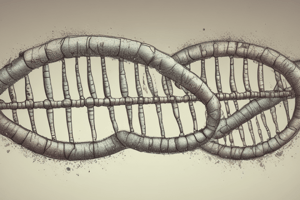Podcast
Questions and Answers
What are chromosomes?
What are chromosomes?
Structures within the cell that contain genes.
Which of the following is controlled by multiple alleles?
Which of the following is controlled by multiple alleles?
- Human height
- Sickle cell disease
- Eye color
- Coat color in rabbits (correct)
Polygenic inheritance involves multiple independent genes for a single phenotypic trait.
Polygenic inheritance involves multiple independent genes for a single phenotypic trait.
True (A)
The contributing alleles are denoted by ______ letters.
The contributing alleles are denoted by ______ letters.
What is described as a permanent change in genes or chromosomes?
What is described as a permanent change in genes or chromosomes?
Match the terms with their definitions:
Match the terms with their definitions:
Name one example of a human disease regulated by multiple genes.
Name one example of a human disease regulated by multiple genes.
Flashcards are hidden until you start studying
Study Notes
Chromosomes and Genes
- Chromosomes are cellular structures that house genes, the units of heredity.
- Genes provide instructions for protein synthesis, influencing physical traits like hair color.
Multiple Alleles
- Traits can be controlled by more than two alleles at a chromosomal locus.
- Rabbit coat color is determined by four alleles: C, cch, ch, and c.
- Human blood type is determined by three alleles (A, B, O) resulting in four phenotypes: A, B, AB, and O.
Genotype and Environmental Interaction
- Both genotype (genetic makeup) and environmental factors shape phenotype (observable traits).
- Polygenic inheritance involves multiple genes influencing a single trait, each contributing with alleles represented as capital (contributing) or lowercase (non-contributing) letters.
- Traits like height, hair color, eye color, and diseases such as diabetes and asthma are examples of polygenic traits.
Chromosomal Theory of Inheritance
- Genes are aligned with chromosomes, influencing inheritance patterns as outlined by the chromosomal theory.
- During meiosis, homologous chromosomes and their alleles segregate, leading to gametes with varied combinations.
- Fertilization restores the diploid number and paired condition for alleles in the offspring.
Sex Chromosomes
- Sex chromosomes carry genes that determine an organism's sex.
- Drosophila studies illustrate inheritance patterns for traits like hair color (B for black, b for brown).
Chromosomal Mutations
- Mutations involve permanent alterations in genes or chromosomes, potentially passed to offspring through gametes.
- Common mutations include monosomy (2n-1) and trisomy (2n+1).
- Turner Syndrome arises from monosomy of sex chromosomes; Down Syndrome results from trisomy of chromosome 21.
Polyploidy
- Polyploids possess more than two sets of chromosomes, classified as triploids (3n) or tetraploids (4n).
- Hybridization and polyploidy drive changes in plant evolution.
Chromosomal Structural Changes
- Types of chromosomal structural changes include:
- Deletion: Loss of a chromosome segment.
- Duplication: Repetition of a chromosome segment.
- Inversion: Reversal of a chromosome segment.
- Translocation: Attachment of a chromosome segment to a non-homologous chromosome.
Human Genetics
- Sickle cell disease results in the deformation of red blood cells, leading to various health complications.
Studying That Suits You
Use AI to generate personalized quizzes and flashcards to suit your learning preferences.




